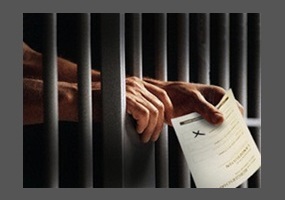PRISONERS VOTING

Prison voting.
The National Conference of State Legislators provides the following information on felons and voting rights:
- Felons do not lose their right to vote while incarceration in two states: Maine and Vermont.
- Felons lose their voting rights only while incarcerated in 14 states and the District of Columbia with restoration of those rights upon release.
- Felons in 22 states lose their voting rights while on probation, incarcerated, and on parole. Their voting rights are restored after complete servitude of sentence.
- Felons in 12 states lose indefinitely their voting rights following conviction of certain offenses. Felon voting rights in these states can be restored through a governor’s pardon.
The inmates in Vermont and Maine who wish to vote can do so by mailing in their absentee ballots.
Presidential candidate Bernie Sanders, a Vermont senator, recently stirred social and mainstream media attention when he said during a CNN town hall meeting that all inmates, including those serving prison sentences for domestic terrorism, sex offenses, and violent crimes should be allowed to vote.
Senator Sanders said the right to vote is inherent in a democracy.
That’s not completely accurate.
In 1776, when this nation’s democracy got underway, only white male landowners over the age of 21 enjoyed the right to vote. The Founding Fathers’ definition of democracy was not quite as literal as the Vermont senator.
Advocates of the right of incarcerated felons to vote say it contributes to their decision to rehabilitate.
While I cannot speak to the issue of voting because I have never voted a single time in my life, I can speak, with a certain expertise, to felons and penal rehabilitation. The decision to rehabilitate in the prison setting is a deeply personal, individualized choice. That decision is not influenced by group counseling, participation in self-help programs like AA, or educational achievements. The decision to rehabilitate precedes the decision to participate in what are widely recognized as “rehabilitation programs” in the penal setting.
Thus, the right to vote certainly does not contribute to the individualized decision to rehabilitate.
Personally, I could care less, one way or the other, whether incarcerated felons should enjoy the right to vote. However, I do believe that all discharged felons—via goodtime release, state parole, or federal supervised release—should automatically have their voting rights restored to them.
If the right to vote was available in the prison setting, the Aryan Brotherhood-type gangs would cast their lot with President Trump. the Barrio Azteca-type gangs would cast their lot with Julian Castro, and the Black Guerilla Family-type gangs would cast their lot with Cory Booker. Presidential candidates Kamala Harris and Amy Klobuchar would not fare well in prison voting because they are former prosecutors. Beto O’Rourke, Peter Buttigieg, Bernie Sanders and Elizabeth Warren would split the relatively small “rehabilitated” vote. And Tim Ryan would probably walk away with the “incarcerated vets” vote.
The rest in the Democratic presidential field would have to turn their attention to the prison guard vote, too many of who cannot spell “vote” if you spot them the “v” and “e.”
This is my prison voting lesson for today.
One last note: I do admire Sen. Sanders’ courage to honestly answer the prison voting question.